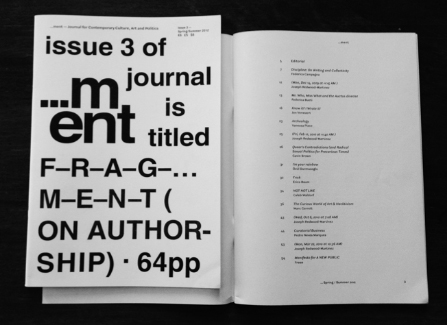International Journal of Communication, Vol. 6, with special sections: Info Capacity, Piracy Cultures (2012)
Filed under journal | Tags: · copyright, filesharing, information, intellectual property, internet, p2p, piracy, technology, web
The International Journal of Communication is an online, multi-media, academic journal that adheres to the highest standards of peer review and engages established and emerging scholars from anywhere in the world. The International Journal of Communication is an interdisciplinary journal that, while centered in communication, is open and welcoming to contributions from the many disciplines and approaches that meet at the crossroads that is communication study.
Special sections: Info Capacity, Piracy Cultures.
Features: Transnational Connections Symposium.
Editor: Larry Gross
Published by University of Southern California, Annenberg Press, Los Angeles, CA, 2012
PDF (PDF articles)
Comment (0)…ment Journal, 3: Frag…ment (On Authorship) (2012)
Filed under magazine | Tags: · authorship, collective art, intellectual property, knowledge production, technology

“Issue 3 of …ment investigates the current debates and practices surrounding the concept of authorship and the possible modes of resistance attached to it. Looking at broad topics such as intellectual property, collectivity, knowledge production and technology, this issue is concerned with the re-articulation of such themes in a transforming political landscape. What is an author and how do we understand authorship and its politics?”
Contributors: Erica Baum, Gavin Brown, Federica Bueti, Federico Campagna, Övül Dormusoglu, Freee, Marc Garrett,Pedro Neves-Marques, Joseph Redwood-Martinez, Vanessa Place, Jan Verwoert, Caleb Waldorf.
…ment: Journal for Contemporary Culture, Art and Politics, Issue 3 – Spring/Summer 2012
Editor-in-chief: Federica Bueti
Editors: Benoit Loiseau, Clara Meister
64 pages
launch of the issue (3 May 2012, London)
HTML (updated on 2020-10-19)
PDF (added on 2020-10-19)
Joanna Demers: Steal This Music: How Intellectual Property Law Affects Musical Creativity (2006)
Filed under book | Tags: · copyright, hip hop, intellectual property, law, music, musique concrète, sampling

Is music property? Under what circumstances can music be stolen? Such questions lie at the heart of Joanna Demers’s timely look at how overzealous intellectual property (IP) litigation both stifles and stimulates musical creativity. A musicologist, industry consultant, and musician, Demers dissects works that have brought IP issues into the mainstream culture, such as DJ Danger Mouse’s “Grey Album” and Mike Batt’s homage-gone-wrong to John Cage’s silent composition “4’33.” Demers also discusses such artists as Ice Cube, DJ Spooky, and John Oswald, whose creativity is sparked by their defiant circumvention of licensing and copyright issues.
Demers is concerned about the fate of transformative appropriation—the creative process by which artists and composers borrow from, and respond to, other musical works. In the United States, only two elements of music are eligible for copyright protection: the master recording and the composition (lyrics and melody) itself. Harmony, rhythm, timbre, and other qualities that make a piece distinctive are virtually unregulated. This two-tiered system had long facilitated transformative appropriation while prohibiting blatant forms of theft. The advent of digital file sharing and the specter of global piracy changed everything, says Demers. Now, record labels and publishers are broadening the scope of IP “infringement” to include allusive borrowing in all forms: sampling, celebrity impersonation—even Girl Scout campfire sing-alongs.
Paying exorbitant licensing fees or risking even harsher penalties for unauthorized borrowing have become the only options for some musicians. Others, however, creatively sidestep not only the law but also the very infrastructure of the music industry. Moving easily between techno and classical, between corporate boardrooms and basement recording studios, Demers gives us new ways to look at the tension between IP law, musical meaning and appropriation, and artistic freedom.
Publisher University of Georgia Press, 2006
ISBN 0820327778, 9780820327778
178 pages

